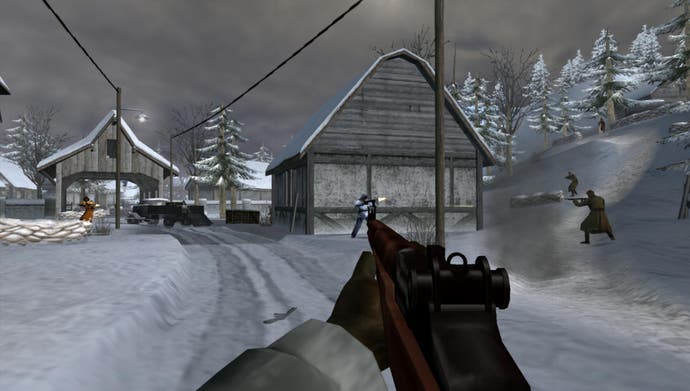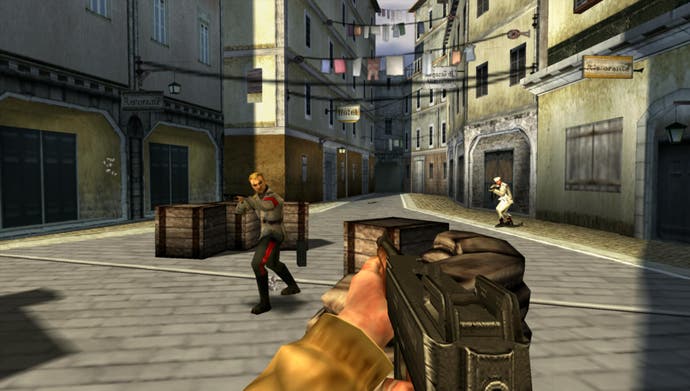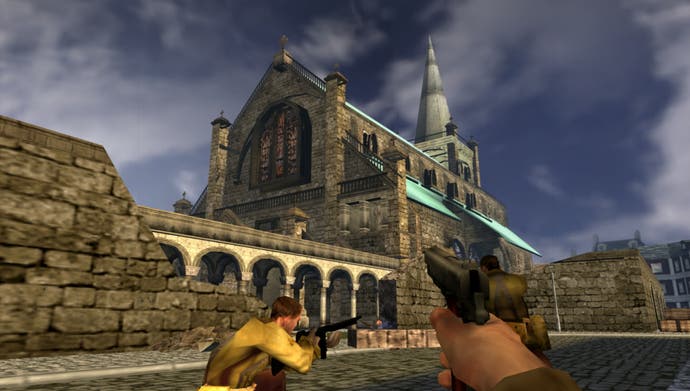Medal of Honor: Heroes
We can be heroes, just for one day.
As unreasonable as it might seem, I believe that I should be able to withstand at least a dozen bullets before I fall down, while enemies really ought to give up their ghosts after one neat shot to the head. I demand realism for others, and super-human powers for me. Got a problem with that?
Medal of Honor: Heroes' peculiar design allows you to maintain dignity and bodily organs for ludicrous amounts of lead, but then seems to offer the same supernatural skill to the AI enemies. As fair as that must sound, it's simply, well, not fair. I'm the hero, goddammit, not them. Let me be a hero!
It's a peculiar affair. Rather than fulfilling the PSP's curse of receiving a straight port, FPS Heroes has a brand new single-player campaign for the handheld, along with the series' trademark archive film footage of the wartime events. Reprising characters from previous MoH games, it's hard not to feel like these are the games' leftovers. Lt. Jimmy Patterson (MoH, Frontline) is back in Holland, Sergeant John Baker (Allied Assault Breakthrough) blasts through Italy, and Lt. William Holt (European Assault) is in the Ardennes Forests. Although for all the characterisation, they may as well be any old grunts.
It's not clear whether EA simply thought that people would fondly remember their names and that would do for character establishment and plot, or if the single-player campaign's disposability was more cynically deliberate. Either way, the result is a remarkably repetitive sequence of levels that feel uncannily like they were designed for multiplayer.

The repetitiveness is even more blatant than you might imagine. As early as the fourth level of the first chapter a location is repeated, with even the non-compulsory objectives hidden in the same locations as last time. It's gaming déjà vu. However, even new areas feel quickly familiar. It is, at first, quite a blessed relief to be in a wartime FPS that isn't prescribed corridors. The levels give you a clutch of objectives, some essential, some voluntary, and then a compass indicating the direction of each. You can attempt them mostly in your own order, the wide (but tightly contained) spaces open in all directions. However, the consequence of this freedom is the arbitrary nature of the enemy attacks. Many missions require that you capture an area of town, which requires standing near a flag for a certain length of time. Capturing a flag, eh? Sometimes this task can be completed without you or your endlessly disposable fellow soldiers encountering a single Axis troop. Other times it's a constant crazed onslaught from all directions. Surely this is more how a multiplayer game works?
More annoying than the non-existent story or scatterbrained level design are the bugs. Soldiers occasionally walk through walls, or get stuck inside them, or even worse, sense an enemy the other side of a wall and excitedly throw a grenade toward them. Bounce, bounce, kaboom. That can prove a bit frustrating. It then gets even more peculiar, with enemies pinging into existence right in front of you, or your own troops vanishing as they run along. By the nature of the game, none of these matters very much at all, but they do lend a strong tone of shabbiness to a surprisingly good looking game. It's still angular and pixelly, but it's almost PS2 quality, and reminds you why the PSP will always take the DS to school in some regards.
Like a 1970s Dalek, stairs appear to be the most deadly thing in battle. Because the PSP requires you juggle FPS controls across one analogue stick and a smattering of buttons, the face buttons are also used for camera movement. I found the best recreation of what ideally would be mouse and keyboard comes with setting square and circle to strafe, letting the camera swing around more efficiently on the analogue. However, this doesn't solve the same sluggish movement up and down, meaning multiple heights in battle lead to frequent deaths. And death leads to starting the level over again. Movement is similarly viscous, with very limited ability to run, your character's legs feeling full of porridge.

The whole thing can be cleared in less than a day's play (now go back and see how incredibly clever my strapline is), and with teeny weeny levels, starting one over isn't quite the ordeal it might sound. Some are as short as ten minutes, even if you seek out the (meaningless) optional objectives, which feels a bit ridiculous. Fortunately the difficulty levels are well-paced, meaning a fly through on the normal mode will be replaced by a much tougher experience for anyone wanting to challenge themselves. The catch is, with death more likely, the threat of having to go through the same uninspired sequence multiple times is rather unappealing.
As I began saying, the enemies are also a little resilient to bullets. The PSP has always been a pain for the FPS, and while a giant cursor means accuracy isn't too impossible, there's very disappointingly none of decent sense the console Call of Duty games have employed, where they subtly aid your aim without your noticing. But when you do get a baddy in your sights and empty a clip in his face, it's a little frustrating when he blinks and carries on shooting.
So as I so very subtly hinted before, it's clear that the real focus of design was on the multiplayer game. For those who've forgotten their WEP password there's a Skirmish mode, where you can play against and with 15 AI opponents, as well as an eight-player local wireless option. But really where the game finds its feet is in the 32-player online game.

The modes aren't really as varied as they'd like you to think, but each is perfectly enjoyable. There's a bog-standard deathmatch, which while obvious is perhaps the most immediately engaging. 32's a nice number in the wide open levels, and plays impressively smoothly on the Sony slab. There are fifteen maps available, each containing multiple-levelled buildings, open spaces, and underground tunnels, which is all you need for a bit of Allie on Allie action. Demolition is a team game where one group must defend a target, while the others attempt to destroy it. Infiltration mode mimics the mode so ludicrous in single-player, where standing next to a flag for a minute in some way defeats an enemy. In MP it's obviously a lot more acceptable. Hold the Line is about defending territory - an online game recently made wonderful by Call of Duty 3, but more simplistic here. Battle Lines and Domination are both based around controlling three locations (another idiotic mode when in the SP campaign), the former capturing them as quickly as possible, the latter about maintaining their control.
While the same problems with the slow movement, and slower camera, are obviously problematic in multiplayer, they aren't, however, dealbreakers. With all the other players restricted in the same ways, the cruelty of the AI's agility is removed, and it's a balanced experience. The PSP isn't exactly overwhelmed with decent multiplayer FPSs, and while imperfect, Heroes does offer a much-needed online fragfest.
It's impossible not to punish the short single-player campaign. That's what MoH games have always been about, and they've previously put at least some effort into creating characters, even if they've never come close to Call of Duty's ability to make the lives of the soldiers around you count. And while the multiplayer is fun, it's hardly revolutionary. Marked separately, the campaign would get a 4. The multiplayer deserves a 6. So it's going to be 5, which makes sense. But take the relevant advisement.
One last thing. The sound is mostly fine, but for the soldiers' odd little noises. Everywhere they go, your collection of drones make a sound something like someone shaking a plastic bag filled with nails. And the barks are few and far between. The first time someone shouts "Good shot!" I thought, "Blimey, thanks very much!" Then when I managed to hit a tree and received the same adulation, it began to mean ever so slightly less. And someone else tell me, is it my imagination, or are they constantly yelling "emetic"? Do they feel sick? War can be tough, but do I need to be informed of every churn in their belly?

